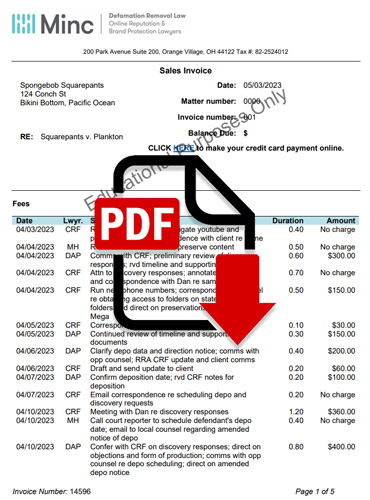
What You Need to Know About Your Minc Law Invoice
This page has been peer-reviewed, fact-checked, and edited by qualified attorneys to ensure substantive accuracy and coverage.
At Minc Law, we understand that clients often have questions about invoicing and managing their legal expenses. We believe it is crucial for our clients to have a clear understanding of their invoices so that they can effectively manage their legal costs, ensure that their case is progressing appropriately, and they get the most out of their legal representation.
With our extensive experience handling thousands of legal matters, we are well aware of the common concerns clients have about the billing process. We are committed to transparency and want to address any questions or uncertainties you may have.
Our objective is to empower you with the knowledge and information necessary for a successful legal engagement. By familiarizing yourself with the details outlined in this article, you will gain insight into typical costs, how your attorney’s invoice is structured, and what to expect from your attorney-client relationship.
In this article, we will provide guidance on different payment structures utilized by attorneys, the range of expenses you might encounter in internet-related cases, tips for deciphering your attorney’s invoice, and reasonable expectations for your ongoing attorney-client relationship.
Minc Law Tip: Legal jargon can often be puzzling for many clients. To simplify matters, we have put together a comprehensive guide to help you grasp the basic legal terms you may come across during your engagement.
How Internet Defamation Attorneys Bill & Collect Fees
Internet defamation attorneys, like other legal professionals, employ a variety of methods to bill their clients and collect fees for their services. These methods may include hourly rates, flat fees, minimum fee retainers, or retainer agreements, depending on the nature and complexity of the case.
What is the Difference Between a Retainer Fee & a Flat Fee?
A retainer fee agreement is a contractual arrangement in which a client pays a predetermined amount upfront (i.e. an advance) to secure the services of an attorney. This retainer fee is generally applied to future legal work and may be replenished as needed. Retainer agreements are often used in cases that require ongoing legal representation or where the total cost of the case is uncertain.
Once the attorney starts working on the case, they will bill their hourly fee against the retainer on a monthly basis. Billable time pertains specifically to the duration during which an attorney is actively engaged in working on a case. It does not encompass non-work-related activities such as lunch breaks or office conversations.
Attorneys typically bill their time in six-minute increments, breaking each hour into ten equal segments. For example, if an attorney’s billable rate is $350 per hour and they bill 0.4 hours for a particular task, $140 ($350 x 0.4) will be deducted from the client’s retainer.
Flat fees, on the other hand, are a predetermined, one-time payment. This fee structure is typically employed for cases with a clear scope and predictable workload, such as drafting cease and desist letters.
What Are the Types of Retainer Fees That Minc Law Utilizes?
Our attorneys typically use retainer fee agreements for most hourly and litigation matters. The amount of the retainer fee will vary based on the nature and scope of work agreed upon with your attorney.
We use several types of retainers to accommodate the diverse needs of our clients, including:
- Standard retainers,
- Evergreen retainers, and
- Minimum fee agreements.
Once the retainer is paid, the funds are placed in a separate account. The law firm then uses these funds to cover the cost of work performed.
Standard Retainer Agreements
Standard retainers are the most common type of retainer agreements employed at Minc Law. Under this arrangement, clients provide an upfront payment, which the law firm bills against as work is carried out. Each month, clients receive an itemized invoice that outlines the work completed, the amount deducted from the retainer to cover the invoice, and the remaining balance of the retainer.
In situations where the attorney’s billed time exceeds the retainer amount, clients will be invoiced for the outstanding balance. Typically on a monthly basis until the matter is completed. On the other hand, if, at the conclusion of the matter, the attorney’s billed time is less than the retainer amount, clients will be refunded the unused portion of the retainer.
Evergreen Retainer Agreements
Under an evergreen retainer agreement, clients maintain a specified balance in their account at all times. When the balance falls below a certain threshold, the client replenishes the retainer to ensure the availability of ongoing legal services.
Minimum Fee Agreements (MFAs)
Minimum fee agreements (MFAs) establish a baseline cost for the attorney’s services, taking into account the scope of work and the complexity (or urgency) of the case. Clients pay the minimum fee, and the law firm bills against it as work is carried out. If the attorney’s time spent on the matter exceeds the minimum threshold, clients will owe additional funds.
At Minc Law, we utilize MFAs for matters that are urgent, such as sextortion cases. MFAs enable our dedicated team to begin on your time-sensitive matter immediately and ensure that your case takes priority over other matters we are already handling. Further, we use MFAs because of the hard-earned kowledge and experience we have accrued handling these types of matters over the years. Finally, MFAs are a fairly calculated estimate of the substantial amount of work that we know is required for these types of matters.
The MFA serves as a guaranteed payment for the attorney’s work and is earned upon receipt. This means that as soon as the client pays the fee, the attorney has earned that money and can immediately begin work on the matter. This arrangement differs from other types of retainers, which act as a deposit that can be refunded if there is any remaining balance after the work is completed.
Understanding the Types of Flat Fees Minc Law Uses
Minc Law offers clients a limited option for flat fee services for certain cases that do not involve litigation. Circumstances where we agree to flat fees, are generally limited to Guaranteed content removals from cheater sites and public shaming websites.
It is important to note that flat fee arrangements are typically not suitable for many types of hourly matters or lawsuits due to the unpredictable nature of such cases.
Costs & Fees Associated with Your Internet Defamation or Online Harassment Issue
Clients facing internet defamation or online harassment issues should be aware that their invoices may include various costs and fees common to these types of cases. However, it is essential to remember that each case is unique, and not every client or case will require costs related to items on this list. Likewise, this list is not comprehensive:
Local Counsel Fees
Local counsel may be necessary in a client’s case when the matter involves legal proceedings in a jurisdiction where their primary attorney at Minc Law is not licensed to practice. Local counsel simply refers to an attorney licensed to practice law in a specific jurisdiction, as they may be needed to navigate local rules and procedures.
For instance, if your Minc Law attorney is licensed in Ohio and your defamation case is based in California, your primary attorney may need to work with local counsel licensed in California.
Court Fees & Case Costs
Litigation may involve various court fees and case-related costs. Below are brief explanations of potential fees and costs clients may encounter.
Filing Fees
Pleadings are formal written documents filed with the court that outline the parties’ positions and claims. There may be fees associated with the filing of pleadings, such as complaints, answers and counterclaims, or motions.
Subpoena Production Costs
A subpoena is a legal order that compels a witness to testify or produce documents. In internet defamation cases, attorneys may need to issue subpoenas to obtain identifying information about a perpetrator, such as acquiring an IP address from a hosting platform.
Issuing a subpoena can be an expensive process, with costs ranging from $50 to $2,000 or more, depending on the complexity of the subpoena. Courts may also charge fees for issuing subpoenas, adding to the overall cost of the case.
Process Server Costs
A process server delivers legal documents, such as subpoenas or summonses, to the intended recipients. Clients may be billed for the process server’s services, and these costs typically range from $50 to $300.
Private Investigator Services
Sometimes, a private investigator may be hired to gather evidence or locate witnesses. Clients should expect to pay between $40 to $200 per hour for the investigator’s services.
Expert Witness Services & Testimony
An expert witness is a professional with specialized knowledge who may be called upon to testify in court. They are often used in defamation cases to help prove damages or when there is a dispute related to witness identification evidence. Expert witness fees can vary, depending on their expertise and the complexity of the case.
Court Report & Transcription of the Court Report
A court reporter is responsible for creating a written record of court proceedings like hearings, depositions, and trials. Clients may be charged for the court reporter’s services and the production of transcripts.
Videographer Services & Recordings
Sometimes, a videographer may be hired to record depositions or other court proceedings. Many legal professionals prefer video recordings over transcripts because videos preserve important non-verbal cues, such as body language and tone, which cannot be captured in a written record.
Appeals
If a client decides to appeal a court’s decision, they may incur additional fees related to the appellate process, including filing fees and costs associated with preparing the appeal.
Postage & Office Supplies
Clients may be billed for postage and office supplies used during their case, such as mailing documents via regular or certified mail or by Federal Express or UPS. While many firms charge clients for photocopying, we do not generally charge our clients for copy paper or faxes.
Attorney Travel Expenses
If an attorney or other professional needs to travel for a client’s case, such as attending hearings, depositions, or meetings, the client may be responsible for covering travel expenses, including airfare, mileage, accommodations, and meals.
Legal Services Performed By Your Attorney or Paralegal
In addition to the external costs associated with local counsel and other case-related fees, clients must consider the internal fees stemming from the work performed by Minc Law attorneys and paralegals. These fees typically include the following:
- Drafting, proofreading, and finalizing documents such as summons, complaints, motions, subpoenas, exhibits, letters, and discovery materials.
- Legal research using resources like LexisNexis and Westlaw, reviewing news publications, identifying points of contact, and gathering background information on defendants.
- Preserving evidence relevant to the case.
- Preparing for hearings, depositions, trials, and other legal proceedings.
- Filing pleadings and other documents with the court.
- Engaging in alternative dispute resolution such as mediation, arbitration, or negotiation.
- Communicating with clients, colleagues within the firm, opposing/local counsel, other parties involved in the case, publications, and outside attorneys regarding the matter at hand.
What Clients Should Not Be Billed For
While most attorneys maintain ethical billing practices, clients need to be aware of certain activities they should not be billed for. Clients should not be responsible for the following:
- Unnecessary, duplicative work: if two attorneys attend a conference and one attorney is responsible for the majority of the discussion, the second attorney should not bill for the entire meeting.
- Training and seminars: law firms may hold interoffice meetings or staff training unrelated to a client’s case, and many attorneys are required to complete continuing legal education (CLE) credits annually. Clients should not be billed for these activities.
- Administrative work by office staff: clients should not be billed for administrative tasks carried out by paralegals and secretaries as part of their normal duties.
- Communications regarding billing: when a client contacts their attorney to discuss concerns about their bill, the attorney should not bill for the time spent addressing the issue.
How to Read Your Minc Law Invoice
Understanding your legal invoice might seem daunting initially, but when you are familiar with the various charges you may incur, you will be better prepared (and can avoid any unexpected surprises). Minc Law invoices are designed to give you all the essential information you need to comprehend the fees and track the progress of your case.
If your attorney uses a retainer and hourly rate, your invoice will likely include the following information:
- Services rendered during the previous month.
- Names of the individual(s) who performed these services.
- The hourly rate charged for the services provided.
- The amount of time spent on your case to date.
- Any disbursement (hard costs) spent for the matter that were advanced by Minc Law.
- The remaining balance of your retainer.
- The amount owed, if any.
- If any courtesy discounts have been applied to your invoice.
When Can Clients Expect to Receive Their Minc Law Invoices?
Clients can typically expect to receive their invoices by the 10th of each month at the latest. If payment has not been received, a reminder will be sent out on the 15th of the month.
Before clients receive their invoices, they will also receive a status update explaining the work done on their case for the month. However, sometimes clients may not receive a written status update if they were just updated by phone or email the week prior.
For clients with minimum fee agreements, generally, invoices will not be sent out until the minimum fee is reached.
Understanding Your Minc Law Invoice [With Sample]
When you enter into a legal engagement with Minc Law, you will receive a detailed monthly invoice like the sample at the link provided. Your invoice will contain all the essential information about your case’s progress and ongoing expenses.
The top section displays your personal details, matter number, invoice number, a link for making a payment, and the due date for the balance.
The Fees section comes next, presenting an itemized timeline of professional services provided in the previous month. Each row, from left to right, indicates the date, initials of the person performing the task, the service rendered, the duration of the task, and the associated cost.
Following this is the Time Summary section, which lists the full names of the attorneys (or other professionals like paralegals or law clerks) whose initials appeared in the Fees section. This section breaks down their hourly rate, the hours spent on your case in the previous month, and the charges for their services during that period.
The Expenses section then itemizes any external costs, such as subpoena services, court fees, travel expenses, and more.
In the Statement of Account section, you will find an overview of your previous balance, new fees and expenses, payments and adjustments, and the current amount due. Below this section, you will see a list of recent Payments and Adjustments linked to your case.
Finally, the Trust Activity displays a timeline of your retainer and itemizes deductions from the retainer as work is completed on your case. It reveals the remaining amount in your trust to be applied toward future case expenses.
What Should You Do if You Find a Mistake on Your Invoice?
Our invoicing process involves multiple layers of review to minimize errors. First, the attorney creates the invoice, followed by an administrative review, and then a final examination before sending it to clients.
If you notice a mistake, take the time to review your invoice thoroughly, examining all pages to pinpoint the mistake. Make a note of the exact error you have discovered. Then, contact us via chat or phone or contact the attorney or paralegal handling your matter.
When discussing the issue, clearly explain the mistake you have found, offering any pertinent details that may help clarify the situation. If possible, provide supporting documentation to substantiate your claim. Finally, request that the firm correct the error and issue a revised invoice promptly. Specify a deadline for when you need the corrected invoice.
How to Pay Your Minc Law Invoice
Paying your Minc Law invoice is simple and convenient. There is a link on the invoice that allows you to pay by credit card or e-check. Alternatively, you can wire funds or send a check directly to the firm. It is important to note that the invoice must be paid within two weeks to maintain applicable discounts.
For clients with an evergreen retainer, it is crucial to ensure your retainer balance is always maintained at the specified amount. This arrangement requires you to replenish the retainer whenever it falls below the agreed-upon threshold.
Reasonable Attorney-Client Expectations
Establishing clear expectations is essential for maintaining a successful attorney-client relationship. Both the attorney and the client should have certain expectations of one another to foster effective communication and collaboration.
Consistent & Open Communication
Your lawyer is legally required to keep you reasonably informed about your case. They should communicate with you when:
- The case is filed,
- Settlement demands or offers are made,
- Key motions are filed and resolved, and
- A case is dismissed.
A strong attorney-client relationship involves open communication where you feel comfortable asking questions and receiving informative answers. It is reasonable to request a general overview of your case but keep in mind that attorneys are often busy, so it is a good idea to be patient. You can typically expect a response from your attorney within 24 hours.
Professional Competence
Your attorney should possess a solid understanding of deadlines, procedures, and general principles in their area of expertise. For instance, a trial attorney should feel at ease in the courtroom, an appellate attorney should have outstanding writing skills, and a defamation attorney should be unafraid of conflict, as it is often part of their job.
While attorneys should be well-versed in their specific area of law, remember that they may not know every aspect of the law instantly. Conducting research on particular matters relating to your case is normal.
Ethics & Professional Obligations
Attorneys must always act within legal boundaries. They should remain loyal to their clients by avoiding conflicts of interest and making truthful and honest representations to both the client and the court.
Your attorney should practice ethically and follow the rules of professional conduct. This includes, at a minimum, maintaining separate financial accounts for client funds and attorney funds.
For example, at Minc Law, client funds are held in an IOLTA (Interest on Lawyers’ Trust Account), which is monitored by the Ohio State Bar. This trust account is solely for client funds and is never mixed with operating funds.
Clear Fee Structure
Regardless of whether an attorney works on an hourly, flat fee, or contingency basis, the agreement must be established and in writing from the outset. If your lawyer does not provide a written contract and suggests a handshake is sufficient, it is best to seek legal representation elsewhere.
For hourly matters, you should expect to receive a monthly invoice. Your attorney should also explain anticipated costs upfront to avoid surprises in your monthly bill. It is not standard practice to bill a client for significant expenses, such as mediation or airfare, without prior knowledge.
What Does the Ideal Attorney-Client Relationship Look Like?
Your attorney-client relationship should be viewed as a partnership. We covered what you can expect from your attorney, but what should your attorney expect from you?
Two-Way Communication
Effective communication goes both ways. If you expect your attorney to update you on your case, make sure to do the same for them. Keep them informed of any relevant updates and be available for discussions about your case. Aim to respond within 24 hours, particularly for time-sensitive matters.
Inform your attorney of your preferred method of communication and update them if your contact information changes.
Receptivity & Open-Mindedness
Your attorney may occasionally deliver news that you do not want to hear. When things take an unexpected turn, try to maintain realistic expectations. Remember that your attorney cannot control every aspect of your case. Instead of being hostile, collaborate with your attorney to address any weaknesses and develop a strategy to resolve your claim.
Participation in Your Case
In some legal matters, your attorney may handle most of the work. However, in other cases, particularly litigation matters, your attorney will require your active participation. If your attorney requests documents, evidence, or information, make an effort to allocate time to provide them with the necessary materials.
Especially in litigation, having more evidence can improve your chances of reaching a satisfactory settlement.
Honesty
Being honest with your attorney is crucial for a successful attorney-client relationship. Do not lie to your attorney, destroy evidence, or omit facts. Your lawyer can only help you prepare for something they are aware of.
Attorneys can handle unfavorable facts. If they know about a potentially detrimental aspect of your case in advance, they can work to minimize its impact. Conversely, lying to your attorney can have adverse effects. Facts usually come to light eventually, so it is better for your attorney to be prepared rather than be caught off-guard at an inopportune time.
Timely Payments
Although it may seem counterintuitive, most attorneys do not enter the legal profession for the money. If they do, they will likely be disappointed.
While attorneys are passionate about their work, it is their job, and they have their own livelihoods, families, and bills to consider. Just as you would not expect your doctor, barber, or landscaper to work for free, do not expect your attorney to work without compensation.
There may be times when you need an extension on a payment; in such cases, communicate with your attorney. They will often work with you to establish a payment schedule that suits both parties. However, as a general rule, make an effort to pay your bill on time. Falling behind on payments could halt your case, even if you are in the midst of litigation.
If You Are the Victim of Internet Defamation or Online Harassment, Get Help Today!
Finding an attorney who is right for your unique internet-related issue can be an overwhelming and confusing task. Further, understanding all the costs and billing systems involved in your matter can be even more challenging.
At Minc Law, we strive to make this process as painless and simple as possible so that you have a clear understanding of what your attorney-client relationship should look like and what costs you are responsible for.
★★★★★
“Absolutely phenomenal. Michael took care of every single issue of defamation. I was concerned about wording because of the public nature of all parties involved, but Michael had open communication and approval from me all along the way. I will suggest him to absolutely anyone.”
KD
June, 2021
If you are the target of online defamation, sextortion, or other internet harassment, reach out to schedule your initial, no-obligation consultation with an intake specialist by calling us at (216) 373-7706, speaking with a Chat representative, or filling out our online contact form.






